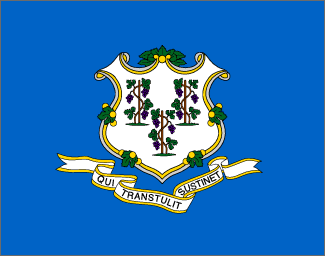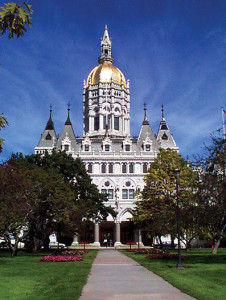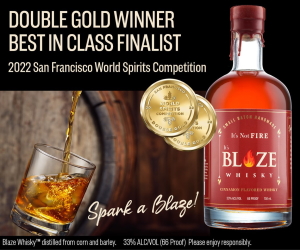
Bills seek to maintain laws, expand consumer access; minimum pricing elimination makes state budget
By Lauren Daley
A number of bills concerning the sale of beverage alcohol and associated operations are going before the Connecticut Legislature this 2017 session. Here is a brief rundown of proposals that could impact the state’s beverage industry and their status as of press time.
 In related industry legislative news, Gov. Dannel P. Malloy presented his budget for the next two fiscal years to the General Assembly on Feb. 8. The plan includesa bill eliminating minimum bottle pricing law for alcohol, as a part of larger elements to address the state’s $1.7 billion deficit.
In related industry legislative news, Gov. Dannel P. Malloy presented his budget for the next two fiscal years to the General Assembly on Feb. 8. The plan includesa bill eliminating minimum bottle pricing law for alcohol, as a part of larger elements to address the state’s $1.7 billion deficit.
The Connecticut Beverage Journal will be following the budget story and bill status throughout the legislative session. Full bill text and testimony on bills can be found on www.cga.ct.gov.
House Bill 5923 would prevent the publication of advertising by liquor retailers that suggests that discounts are being given for liquor regulated by minimum bottle pricing. The bill proposes that general statutes be amended to provide that any person who engages in false or misleading advertising in the sale of liquor, including the sale of alcoholic liquor in violation of minimum bottle price provisions, shall have committed a violation of the general statutes and shall be subject to all applicable fines, penalties and provisions of the general statutes, as well as a mandatory $25,000 fine for each day of publication of such advertising. The bill was discussed at a public hearing on Feb. 7.
House Bill 5925 would amend general statutes to make intentional violation of the alcoholic liquor minimum bottle law a per se violation of section 42-110b of the general statutes, subject to a 10-day alcoholic liquor permit suspension for each permit premises of a permit holder found to be in violation and the imposition of a fine of not less than $50,000 for each day of such violation at each location, in addition to any existing penalties. The bill was discussed at a public hearing on Feb. 7.
Senate Bill 192 would allow tastings of beer produced by Connecticut corporations at grocery stores. Its purpose is to encourage the sale of beer made by Connecticut companies. It was referred to the Joint Committee on General Law on Jan. 18.
House Bill 5933 proposes to allow package store permittees to sell growlers of Connecticut-brewed beer. It was referred to the Joint Committee on General Law on Jan. 19.
House Bill 5260 would allow certain alcoholic liquor license holders to obtain extended-use permits which would authorize the sale of liquor until 4 a.m. in specific entertainment zones designated by the Commissioner of Consumer Protection. It was introduced by Rep. Christopher Rosario and referred to the Joint Committee on General Law on Jan. 6.
House Bill 5730 proposes that permittees authorized to sell alcoholic beverages for on-premise consumption could use an automated self-serve alcoholic liquor machine that would work upon activation of a payment card by an employee of the permittee or a person whom the permittee has verified to be 21 years of age or older. Such automated machine may not dispense a serving of more than 32 ounces of beer, 10 ounces of wine or 3 ounces of spirits before the payment card must be reactivated by the permittee. The bill was discussed at a public hearing on Feb. 7.
House Bill 5928 proposes to promote the growing of hops and barley in Connecticut by creating a farm brewery manufacturer permit. The bill was discussed at a public hearing on Feb. 7.
House Bill 5713 proposes to allow farms to operate on-site distilleries under certain conditions. The Joint Committee on the Environment voted to draft the bill on Feb. 8.
House Bill 5938 proposes to exempt craft beer manufactured in-state and sold in-state from state labeling requirements, provided such craft beer is in compliance with all applicable federal regulations. The purpose is to remove the burden on the in-state manufacture of craft beer. It was referred to the Joint Committee on General Law on Jan. 19.
House Bill 5926 would require any out-of-state manufacturer or shipper of beer, spirits and wine to place all shipments coming into the state in a warehouse facility for no less than 48 hours, to allow inspection of such products by the state, before being shipped to distributors or retailers directly, unless the receiving distributor or retailer is able to segregate such shipments in its own in-state warehouse to allow for inspection by the state. Its purpose is to allow for verification for taxation and public health purposes. The bill was discussed at a public hearing on Feb. 7.
House Bill 5932 would remove the label requirement for alcoholic beverages manufactured and sold only in the state of Connecticut. It was referred to the Joint Committee on General Law on Jan. 19.
Updates on developing stories, will be posted. This story was updated on Feb. 8, 2017.











